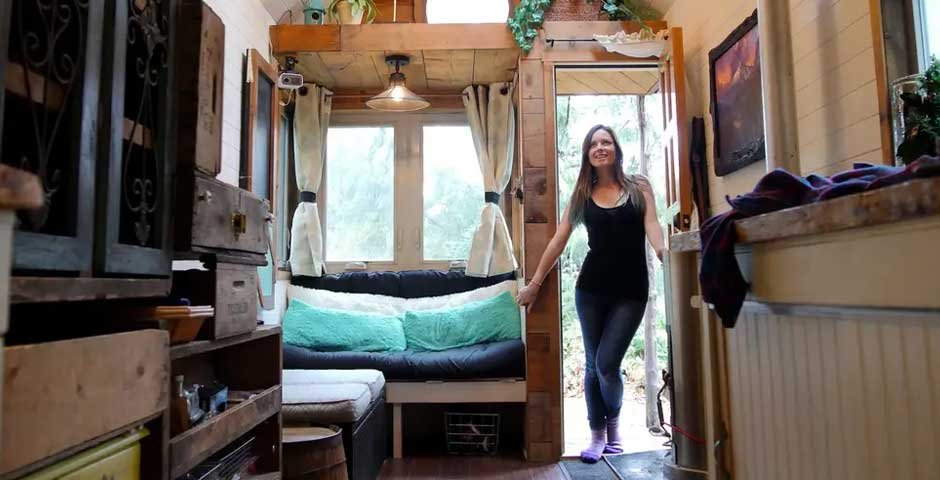In recent years, the tiny house movement has obtaineda significant popularity as people seek alternative and minimalist living solutions. Living in a tiny house offers the appeal of a simpler lifestyle, reduced environmental impact, and financial freedom. Nevertheless, it’s essential to consider whether this unique living arrangement is the right fit for you. We will explore the factors to consider when deciding if living in a tiny house is the right choice for your lifestyle and priorities.
How to check if living in tiny house is the right decision?
1. Embracing Minimalism
Living in a tiny house demands embracing minimalism. With limited space, you must be willing to downsize your possessions and prioritize what is truly essential. A tiny house might be a perfect fit if you value ventures over material possessions and can adapt to a simpler lifestyle.
2. Financial Considerations
One of the significant advantages of living in a tiny house is the potential for reduced expenses. Tiny houses generally have lower upfront costs, lower utility bills, and lessened maintenance costs. Nevertheless, it’s essential to carefully evaluate your financial situation, including the costs of acquiring or building a tiny house, land or rental fees, and ongoing expenses. Assess whether the economic benefits align with your long-term goals and financial stability.
3. Space and Storage Requirements
Living in a tiny house means making the most of limited space. You must be comfortable with compact living arrangements and creative storage solutions. Assess your lifestyle and the items you need to accommodate within the limited space. Adapting to a tiny house lifestyle may be challenging if you have specific hobbies or collections requiring significant storage.
4. Mobility and Flexibility
Many tiny houses are built on wheels, authorizing mobility and flexibility. If you desire the freedom to change locations frequently or have a nomadic lifestyle, a tiny house on wheels might be an attractive option. However, if you prefer a more permanent and rooted living situation, a stationary tiny house may be more suitable.
5. Privacy and Personal Space
Living in close quarters mandates careful consideration of privacy and personal space. While tiny houses can offer a cozy and intimate atmosphere, evaluating whether you are comfortable with minimal separation between living areas is paramount. If you thrive in solitude or mandate reliable private spaces, a tiny house may not provide the level of privacy you desire.
6. Lifestyle and Family Considerations
Regard your lifestyle and the requirements of your family or household members. Tiny houses are well-suited for individuals, couples, or small families who prioritize simplicity and togetherness. However, a tiny house may only deliver the demanded space or amenities to accommodate some comfortably if you have specific lifestyle requirements or a more prominent family.
7. Zoning and Legal Considerations
Research local zoning laws and regulations before committing to living in a tiny house. Some areas have specific restrictions on the size and location of tiny houses, which may limit your options. Ensure you comply with legal requirements and clearly understand the rules governing tiny house living in your desired location.
8. Environmental Consciousness
Living in a tiny house aligns with environmental sustainability and reduced carbon footprint. These small dwellings generally require fewer resources to build and maintain, consume less energy, and produce less waste. If environmental consciousness is a noteworthy priority for you, living in a tiny house can be a positive step towards minimizing your impact on the planet.
9. Mindset and Adaptability
Living in a tiny house mandates a distinct mindset and adaptability. It’s paramount to be unrestricted to a simplified lifestyle, be comfortable with close quarters, and embrace the challenges that may arise. Flexibility, creativity, and a positive outlook are key to accommodating to tiny house living.
Living in a tiny house is a unique and alternative way of life that offers simplicity, financial freedom, and reduced environmental impact. Nevertheless, it is paramount to carefully evaluate whether it aligns with your lifestyle, priorities, and long-term goals. Contemplate factors such as your willingness to embrace minimalism, financial considerations, space and storage requirements, mobility needs, privacy preferences, and the needs of your family or household members.
Living in a tiny house requires a shift in mindset and a willingness to adapt to a simplified lifestyle. It can be a fulfilling and rewarding adventure for those who cherish experiences over material possessions, are conscious of their environmental impact, and seek financial freedom. It proposes the opportunity to live more intentionally and consolidate what truly matters.
Before making a decision, thoroughly research and explore the tiny house movement. Connect with tiny house communities, visit model homes, or attend workshops to acquire a better understanding of the lifestyle and its practical implications. This will help you assemble an informed decision established on your personal preferences and circumstances. If you are looking for tiny house ideas, you can try My ADU.






